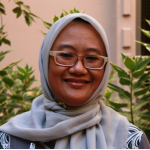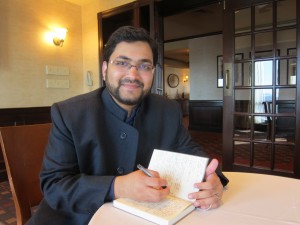Sohaib Sultan is the Imam & Muslim Life Program Coordinator at Princeton University. We spoke to him briefly about his experience in the Islamic Chaplaincy Master’s program at Hartford Seminary.
In what setting do you plan on, or are currently, using your Islamic Chaplaincy degree (i.e. hospital, military, education, corrections)? Please expand on your current roles and responsibilities as a Chaplain in your particular setting.
I’ve used my training at the Hartford Seminary to work on college campuses as a university chaplain. For the last seven years I’ve been at Princeton University. My responsibilities as the university Muslim chaplain are manifold. Every day is a new day with its own set of joys and challenges. My work is divided into six converging categories: organizing Muslim worship and devotion on campus; counseling and advising students on the myriad of questions and challenges they face from religion to relationships; advocating for the religious needs of Muslim students on campus and representing the Islamic faith when necessary at official university functions; teaching non-academic personal enrichment classes on the Islamic tradition; and, lastly, working closely with other faith chaplains to foster inter-religious dialogue and cooperation.
What should prospective students know about Hartford Seminary and the Islamic Chaplaincy program?
The Islamic Chaplaincy Program at Hartford Seminary is a really unique and outstanding program. If you want to learn how to be a religious leader who can apply theology and ethics in the real lives of real people, then the seminary is for you.
Please click here to continue reading about Sohaib and his time at Hartford Seminary.
Taqwa Surapati graduated from the Muslim Chaplaincy program in May of 2014 and is a Healthcare Chaplain at Stanford Hospital as well as a volunteer chaplain at Zaytuna College in Berkeley, California. We had a conversation with her about her experience as a Muslim Chaplaincy student at Hartford Seminary.
of 2014 and is a Healthcare Chaplain at Stanford Hospital as well as a volunteer chaplain at Zaytuna College in Berkeley, California. We had a conversation with her about her experience as a Muslim Chaplaincy student at Hartford Seminary.
What sets the Hartford Seminary environment apart?
The setting: a community of learners, fellow Muslims from different parts of the country and diverse backgrounds. You have to live and learn together despite differences. There is a big cohort of Muslim students each year, that I hope we continue to grow as an educated society.
The faculty: highly professional and qualified senior lecturers, where you learn not only from classroom and discussion times, but from their respectful attitude and love towards one another in social settings. I have never seen any other faculty members behave with such beautiful conduct as our role models.
The curriculum: rigorous and complete, especially for the MA and Islamic chaplaincy. Not every seminary or theological school demands such complete mastery and understanding with weekly reflections! It gave me confidence and in-depth understanding preparing me to work as a chaplain.
The community: an interfaith community within the institution is a good way to train open communication in the real world.
To read more about Taqwa, her work, and desire to study at Hartford Seminary, please click here.
What is a Chaplain
A chaplain is a professional who offers spiritual advice and care in a specific institutional context, such as a military unit or a college campus, hospital or prison. Although chaplains often provide religious services for members of their own faith communities, the main role of a chaplain is to facilitate or accommodate the religious needs of all individuals in the institution in which he or she is working.
Chaplains often serve as experts on ethics to their colleagues and employers, providing insight to such diverse issues as organ transplantation, just-warfare, and public policy. Professional chaplains do not displace local religious leaders, but fill the special requirements involved in intense institutional environments.
Thus, a Muslim chaplain is not necessarily an “Imam,” although an Imam may work as a chaplain. There is a need for both male and female Muslim chaplains. For example, female Muslim students on college campuses or hospitalized Muslim women may feel more comfortable with a Muslim woman chaplain.

 Sign-up now ›
Sign-up now ›